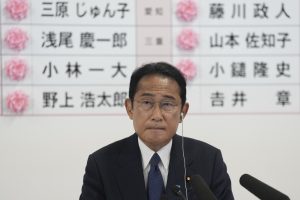It was a very shocking day for the whole nation: Abe Shinzo, Japan’s longest-serving prime minister, died after being fatally shot in the ancient capital of Nara on July 8. He abruptly became a tragic hero not only in Japan, but also in the rest of the world. For Japanese, the incident has the same magnitude as the assassination of President John F. Kennedy for Americans.
Abe had been a very familiar face in the daily news for decades in Japan. He was the most popular – and most powerful – stateman in the present day. He was a part of our everyday life. So many Japanese, myself included, have an empty feeling inside now.
Although Abe faced many scandals domestically, such as questions about the funding of Japan’s cherry blossom party, there is no denying that he was a prominent player on the global stage with a strategic vision. He always acted like an extrovert. In many ways, he was a notable politician, a rare type of Japanese.
Now the Japanese public is blaming the local police and the national security service for allowing this horrendous act to happen. They failed to protect Abe from the 41-year-old killer, Yamagami Tetsuya.
The assassination of Abe has made the world aware that Japan’s crisis management measures are vulnerable. The Japanese police, especially the Nara Prefectural Police, disgraced itself in front of the international community.
Japan has some of the strictest gun laws in the world, so it is apparent that the police did not expect a shooting with a homemade gun. It must have been a total surprise, beyond the scope of their assumptions.
But Yamagami’s assassination method – approaching and shooting at the target – is extremely well-worn. For example, this method was depicted in the famous U.S. movie “Taxi Driver” released in 1976. In the film, a former U.S. Marine, played by Robert De Niro, felt isolated after returning to his home and attempted to kill a U.S. presidential candidate during the election campaign. However, unlike Japanese police, U.S. security officers in the film noticed the shooter’s suspicious behavior and succeeded in blocking him in advance. It’s a very famous movie scene.
Why, then, were the police in Nara caught so off guard? I would argue that the Japanese as a society have grown so used to peace that we are not well prepared for the worst-case scenario.
According to the police, the suspect, Yamagami, believed Abe was linked to the Unification Church, a religious group established by South Korean religious leader, Sun Myung Moon, in 1954. Yamagami, who grew up in a single-mother home, blamed this religious group for bankrupting his mother by forcing her to donate everything. He had a strong grudge against the Unification Church.
Meanwhile, it is well known that Abe’s grandfather and former Prime Minister Kishi Nobusuke started to have ties to Sun Myung Moon in the late 1960s, and that the ruling Liberal Democratic Party and the Unification Church have some ties. The investigation of Abe’s assassination may reveal a dark side of relations between religion and politics, especially conservative politicians.
Abe was shot and killed during a last-minute campaign event, just two days before Japan’s upper house election. In the voting on July 10, the so-called sympathy votes surely boosted the LDP after the assassination of Abe. According to TV Tokyo’s opinion poll Sunday night, 13 percent of TV viewers said they changed the party they voted for after the assassination.
The Japanese media labelled this election as the LDP’s mourning battle for Abe.
Abe was a kingmaker even after he stepped down from premiership two years ago. His death leaves a leadership vacuum within the LDP.
He led the LDP’s largest faction, consisting of 94 lawmakers (now 93 without him). Meanwhile, Kishida’s faction is only the fourth largest, with 44 members. There is a high possibility that the Abe faction will break up without the former prime minister, who was its uniting force.
From now on, Kishida will consolidate power without kingmaker Abe.
Kishida and Abe were both elected in the lower house elections in 1993 for the first time. So they are contemporary fellows and strong political rivals for internal leadership in the LDP.
In mid-June, Japanese media such as the conservative Sankei Shimbun reported on the latest skirmish between Kishida and Abe.
Kishida had replaced Vice Defense Minister Shimada Kazuhisa with Suzuki Atsuo, who had served as commissioner of the Acquisition, Technology, and Logistics Agency under the Defense Ministry. The appointment, which went into effect on July 1, was decided although Defense Minister Kishi Nobuo, Abe’s younger brother, had requested that Shimada be kept at the ministry’s top administrative post ahead of a planned revision of Japan’s key defense policy papers, including the National Security Strategy toward year-end.
Kishida rejected that request, saying that the government customarily limits the term of vice minister to two years.
Shimada left office as vice minister on July 1, but Kishi named him special adviser to the minister and consultant for the ministry within the day.
For this reason, Japanese political experts are focusing on whether Kishida will replace Kishi in the next cabinet shuffle. He may also replace LDP policy chief Takaichi Sanae, Abe’s close aide, in party executive appointments. Both the cabinet and LDP shuffles are expected to be done this summer at the same time.
If Kishida removes Kishi and Takaichi, that will mean the prime minister has succeeded in enhancing his power base.
The ruling coalition, including the Kishida-led LDP, now have more than two-thirds of seats in the parliament, enough to support a change of the Constitution. Constitutional change was long Abe’s dream, and many LDP members may want to achieve it in his memory.
In addition, Japan will be highly unlikely to see any national election in coming three years. This is called the golden three years for ruling parties, meaning they can do what they want to do in this time.

































